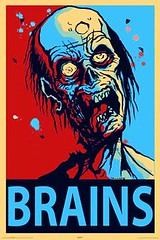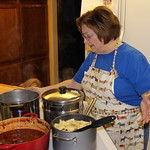 Number one daughter Polly called this morning seeking my counsel and support. She and her boyfriend David have been arguing about zombies. She says zombies are slow and eat only human brains. He says they’re fast, eat flesh as well as brains, and have even been known to eat animals.
Number one daughter Polly called this morning seeking my counsel and support. She and her boyfriend David have been arguing about zombies. She says zombies are slow and eat only human brains. He says they’re fast, eat flesh as well as brains, and have even been known to eat animals.
I agree with my daughter that the only proper zombie is a slow zombie. On the other hand, I’m pretty sure early zombies — and by “early” I mean the ones in George Romero’s landmark 1968 movie Night of the Living Dead — ate human flesh. The brain thing was probably always there, but it solidified with 1985’s The Return of the Living Dead, and even those zombies ate flesh too — it’s just that they considered brains the supreme delicacy.
David’s beliefs have clearly been influenced by more recent zombie movies. Directors and screenwriters have taken zombies up a notch or two. They’re fast now, and when they catch you they rip you open and gobble your guts. Animals? In George Romero’s 2010 movie Survival of the Dead, zombies eat a horse. In the first episode of TV’s The Walking Dead, zombies in Atlanta eat another horse.
David and Polly are both right, but they’re talking about different generations of the undead. Polly and I are originalists. Our zombies are Romero’s zombies from 1968, the slow-shuffling ones. David’s zombies are the undead of the 21st century, quick and nasty and not too particular about their diet.
As far as I know all zombies, old and new, can only be killed by a shot or a spike through the brain. I think this includes the zombies in World War Z, both the book and movie versions. As for those horses, would a bitten animal become a zombie too? I vaguely recall a zombified horse in Romero’s 2010 movie, but might be wrong about that. And if an animal does become a zombie, does it prey on animals only, or will it come after humans as well? In Paolo Bacigalupi’s 2013 book Zombie Baseball Beatdown, a zombie cow does just that! What’s next, zombie cats and dogs? The mind reels.
Sadly, the only direction directors and screenwriters can go with zombies is to keep upping the ante, which is probably why TV’s The Walking Dead has become so over-the-top and silly. If there aren’t yet zombie cats and dogs, by the end of 2014 there most assuredly will be.
——————–
Back to the land of the living. We entertained yesterday, New Year’s Day. Donna spent all day in the kitchen, cooking a veritable Italian feast: antipasti trays followed by sauce, a roast and Italian sausages cooked in the sauce, ravioli, lasagne rollups, spaghetti & meatballs, polenta, green beans with Parmesan cheese; zucchini with onion & tomato, and a green salad. One of our guests brought garlic bread and tiramisu for dessert.
It was way too much food, but we sent everyone home with bulging doggie bags. I wasn’t much help, since I had to work at the museum all afternoon. Donna did all the cooking and preparation, and I only showed up at the last minute to help with the eating.
——————–
I didn’t have a name for it, but InCaps will do nicely: it’s when manufacturers like Apple use eccentric capitalization in product names: iPhone, iPod, and iPad are good examples. That, in and of itself, is benign, but when they force me to use their capitalization scheme I resent it. Try mentioning your ipad on Facebook. Try to send an email about your ipad from an Apple desktop computer (oops, I meant an iMac). Autocorrect will intervene and change “ipad” to “iPad” every time.
I’m with the blogger who wrote the linked article about InCaps: it’s a form of corporate advertising, and, more insidiously, one that forces consumers like you and me into helping corporations push their products.
I don’t want to turn autocorrect off altogether (I make more than my share of typos), but from now on I’ll take the extra step to turn autocorrect’s incapped brand names back into lowercase. Just because I don’t want to be used. Isn’t that reason enough?
By the way — and I’ve blogged about this before — I quit capitalizing “internet” long ago. Many dictionaries still label it a proper noun, and many newspapers and magazines still capitalize the word. I never understood why. It’s not a brand name, and as far as I know the internet’s been in the public domain since day one.
Were the names of earlier communications breakthroughs — the telegraph, wireless radio, television — ever capitalized? If they were, they no longer are, and the internet has been around long enough, and has become so central to our lives, that it has certainly become a common noun, no matter what the dictionaries say.
I’ll leave you with this, one of those semi-spammy George Takai post-its (as opposed to Post-its®) that make up approximately 40% of the content on Facebook and Twitter these days (most of the remaining 60% being outright spam):

Poor Porky Pig! All these years we’ve been making fun of his stutter, when all along he’s merely been speaking in the past pluperfect subjunctive!


